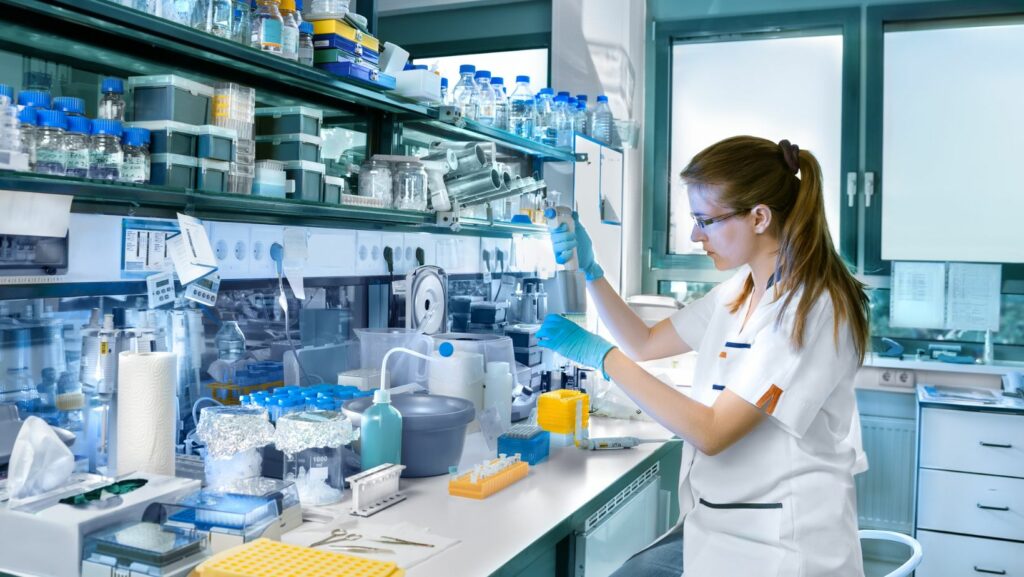Key Takeaways
- High-Tech Transformations: High-tech pharmaceuticals are advancing drug development and enhancing patient care through innovative technologies, including AI and personalized medicine.
- Personalized Approaches: Tailored treatments based on individual genetics improve treatment effectiveness and minimize adverse effects, marking a shift toward personalized medicine.
- Regulatory Complexity: Compliance with stringent regulations poses challenges for innovation and market entry, requiring companies to navigate varied global standards.
- Market Growth Trends: The demand for personalized medicine and investment in AI signify a growing market, projected to experience substantial growth in the coming years.
- Sustainability Focus: Eco-friendly practices are becoming essential within the pharmaceutical sector, reflecting a broader commitment to corporate responsibility and sustainability.
- Collaborative Innovations: Partnerships between technology firms and pharmaceutical companies are crucial for driving research and accelerating the development of novel therapies and treatments.
In a rapidly evolving world, high-tech pharmaceuticals are reshaping the landscape of healthcare. With advancements in technology, the pharmaceutical industry is harnessing innovative solutions to enhance drug development, streamline production, and improve patient outcomes. These cutting-edge approaches not only promise to deliver more effective treatments but also address the pressing challenges of accessibility and affordability.
From artificial intelligence in drug discovery to personalized medicine tailored to individual genetic profiles, high-tech pharma is paving the way for a new era of healthcare. As the industry continues to embrace digital transformation, stakeholders must stay informed about the latest trends and breakthroughs that could revolutionize patient care. Understanding the implications of these advancements is crucial for healthcare professionals, investors, and patients alike.
Hi Tech Pharma
 Hi tech pharma encompasses advanced technologies that revolutionize pharmaceutical practices. High-throughput screening techniques enhance drug discovery processes, enabling the rapid testing of thousands of compounds. Artificial intelligence algorithms analyze vast datasets, improving predictive modeling for drug efficacy and safety.
Hi tech pharma encompasses advanced technologies that revolutionize pharmaceutical practices. High-throughput screening techniques enhance drug discovery processes, enabling the rapid testing of thousands of compounds. Artificial intelligence algorithms analyze vast datasets, improving predictive modeling for drug efficacy and safety.
Personalized medicine, which tailors treatments based on individual genetic profiles, shows significant promise. This approach increases treatment effectiveness and minimizes adverse effects. Innovations like CRISPR gene editing offer new avenues for treating genetic disorders, demonstrating the potential of high-tech solutions in addressing complex diseases.
Biopharmaceutical manufacturing employs cutting-edge techniques such as continuous processing and automation. These methods streamline production, minimize waste, and ensure consistent product quality. Furthermore, blockchain technology enhances supply chain transparency, increasing trust between manufacturers and consumers.
Telemedicine and digital health tools provide real-time patient monitoring and management. These solutions facilitate timely interventions, improving patient outcomes while reducing healthcare costs. As the industry evolves, collaboration between technology firms and pharmaceutical companies accelerates the development of innovative therapies.
Transformative high-tech approaches shape the future of healthcare. Investment in research and development within this sector remains critical for unlocking new treatment possibilities and improving overall public health.
Innovations in high-tech pharmaceuticals significantly enhance drug effectiveness and patient care. Notable advancements include advanced drug delivery systems and personalized medicine approaches.
Advanced Drug Delivery Systems
Advanced drug delivery systems improve the precision and efficacy of medication administration. Techniques such as nanotechnology, microencapsulation, and targeted delivery enable drugs to reach specific sites in the body, reducing side effects and increasing therapeutic efficacy. Examples include liposomes and dendrimers that encapsulate drugs, ensuring sustained release and targeted action. Smart delivery systems that respond to environmental changes, such as pH or temperature, adapt the release of drugs based on the body’s needs.
Personalized Medicine Approaches
Personalized medicine approaches tailor treatments to individual genetic profiles, enhancing treatment outcomes. Genomic sequencing allows healthcare providers to identify specific mutations in patients, facilitating the development of targeted therapies. Companion diagnostics, which accompany treatments, ensure patients receive the most effective therapy based on their genetic makeup. This shift leads to improved efficacy, minimizing adverse drug reactions. The integration of artificial intelligence (AI) in data analysis further refines personalized treatment plans, predicting how different patients may respond to various medications.
Regulatory Challenges In Hi Tech Pharma
Regulatory challenges significantly impact the high-tech pharmaceutical sector. Compliance with stringent regulations ensures safety and efficacy, yet it often complicates innovation and market entry.
Navigating Compliance and Standards
 Navigating compliance and standards requires familiarity with frameworks established by regulatory bodies like the FDA and EMA. Companies must adhere to Good Manufacturing Practices (GMP), Good Clinical Practices (GCP), and Good Laboratory Practices (GLP). Each practice entails strict requirements regarding facility operations, clinical trials, and laboratory work, ensuring consistent quality.
Navigating compliance and standards requires familiarity with frameworks established by regulatory bodies like the FDA and EMA. Companies must adhere to Good Manufacturing Practices (GMP), Good Clinical Practices (GCP), and Good Laboratory Practices (GLP). Each practice entails strict requirements regarding facility operations, clinical trials, and laboratory work, ensuring consistent quality.
Companies face additional complexities related to data integrity and documentation. Regulatory authorities demand thorough record-keeping and audit trails for electronic data, which increases the burden on pharmaceutical companies to maintain accurate and accessible information.
Furthermore, companies encounter hurdles when implementing new technologies. Innovative drug delivery systems, personalized medicine, and artificial intelligence solutions often lack existing regulatory pathways. This uncertainty can delay product approvals and challenge companies in navigating the regulatory landscape.
Global variation in regulations adds further complexity. Different countries enforce unique compliance requirements, necessitating multinational companies to tailor their strategies accordingly. This disparity in standards often leads to increased operational costs and extended timelines for product launches.
Market Trends And Future Outlook
High-tech pharmaceuticals are experiencing dynamic market trends that enhance their role in the healthcare landscape. A rise in demand for personalized medicine indicates a shift toward tailored treatments, leading to improved therapeutic outcomes. By 2027, the global personalized medicine market is projected to reach $2.45 trillion, reflecting a compound annual growth rate (CAGR) of 11.9% from 2020, according to Grand View Research.
Investment in artificial intelligence (AI) is also increasing, with companies allocating significant resources to technologies that streamline drug discovery and development processes. In 2021, investments in AI for drug development exceeded $2.3 billion, showcasing a key trend toward harnessing predictive analytics to enhance research efficiency.
Companies are adopting advanced drug delivery systems, aiming to improve medication administration and ensure optimal patient compliance. The global smart drug delivery systems market is expected to grow from $1.2 billion in 2021 to $5.1 billion by 2026, as reported by MarketsandMarkets. Such systems leverage novel technologies, including nanotechnology and microencapsulation, to target therapies more effectively.
Regulatory landscapes are evolving. Companies face ongoing challenges in adhering to the standards set by organizations like the FDA and EMA, especially concerning new technologies. While regulations ensure safety and efficacy, they also pose hurdles that can delay innovative drugs entering the market. Emerging regulatory frameworks are being developed to accommodate these innovations, addressing the complexities of compliance for multinational operations.
Incorporating sustainability practices is becoming crucial. Pharmaceutical companies are increasingly focusing on eco-friendly production methods, aiming to minimize waste and energy consumption. A 2022 survey by Deloitte revealed that 64% of pharmaceutical executives prioritize sustainability in their operations, indicating a shift in corporate responsibility within the industry.
To remain competitive, collaborations between technology firms and high-tech pharmaceutical companies are essential. Partnerships foster innovation, driving the development of novel therapies and establishing a more efficient production pipeline. Future outlooks suggest that these collaborations will accelerate advancements in gene and cell therapies, enhancing treatment options available for various diseases.
Healthcare professionals, investors, and patients must stay attuned to these trends, as they significantly impact drug innovation and enhance healthcare delivery.
Innovations In Hi Tech Pharma
High-tech pharmaceuticals are reshaping the landscape of healthcare. Innovations in drug development and delivery promise to enhance patient outcomes while addressing critical issues of accessibility and affordability. As personalized medicine gains traction and advanced manufacturing techniques streamline production, the potential for improved therapies continues to grow.
The collaboration between technology firms and pharmaceutical companies will be vital for overcoming regulatory challenges and fostering sustainable practices. Staying informed about these advancements is essential for healthcare professionals, investors, and patients alike. The future of high-tech pharma holds great promise, paving the way for more effective treatments and a healthier society.

